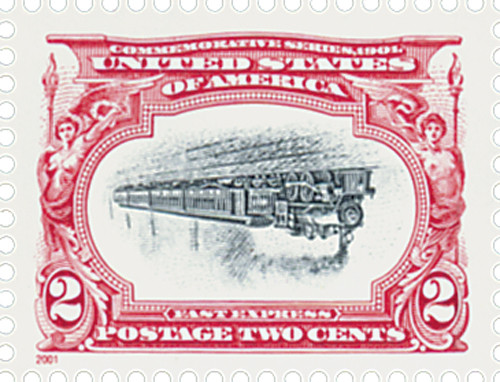
2001 1c Pan-American Invert Reproduction
# 3505a FDC - 2001 1c Pan-American Invert Reproduction
$2.00 - $2.95
U.S. #3505a
2001 1¢ Pan-American Invert
2001 1¢ Pan-American Invert
Issue Date: March 29, 2001
City: New York, New York
Printed by: Banknote Corporation of America
Printing Method: Lithographed and engraved
Perforations: 12 ½ x 12 (others)
Color: Multicolored
City: New York, New York
Printed by: Banknote Corporation of America
Printing Method: Lithographed and engraved
Perforations: 12 ½ x 12 (others)
Color: Multicolored
This 1¢ stamp from the Pan-American Inverts Sheet pictures the steamer City of Alpena. It was mistakenly inverted during its original printing in 1901. The Postal Service decided to purposely make the reproductions inverted on the souvenir sheet. The original dies were used to create the stamps.
The 1901 Pan-American Exposition celebrated the impressive progress America had made in engineering and industry. Six stamps were issued in conjunction with the fair. They were the first stamps of the twentieth century and the first bi-colored general release since the 1869 Pictorials. A printing error caused a number of prized inverted stamps.
U.S. #3505a
2001 1¢ Pan-American Invert
2001 1¢ Pan-American Invert
Issue Date: March 29, 2001
City: New York, New York
Printed by: Banknote Corporation of America
Printing Method: Lithographed and engraved
Perforations: 12 ½ x 12 (others)
Color: Multicolored
City: New York, New York
Printed by: Banknote Corporation of America
Printing Method: Lithographed and engraved
Perforations: 12 ½ x 12 (others)
Color: Multicolored
This 1¢ stamp from the Pan-American Inverts Sheet pictures the steamer City of Alpena. It was mistakenly inverted during its original printing in 1901. The Postal Service decided to purposely make the reproductions inverted on the souvenir sheet. The original dies were used to create the stamps.
The 1901 Pan-American Exposition celebrated the impressive progress America had made in engineering and industry. Six stamps were issued in conjunction with the fair. They were the first stamps of the twentieth century and the first bi-colored general release since the 1869 Pictorials. A printing error caused a number of prized inverted stamps.













